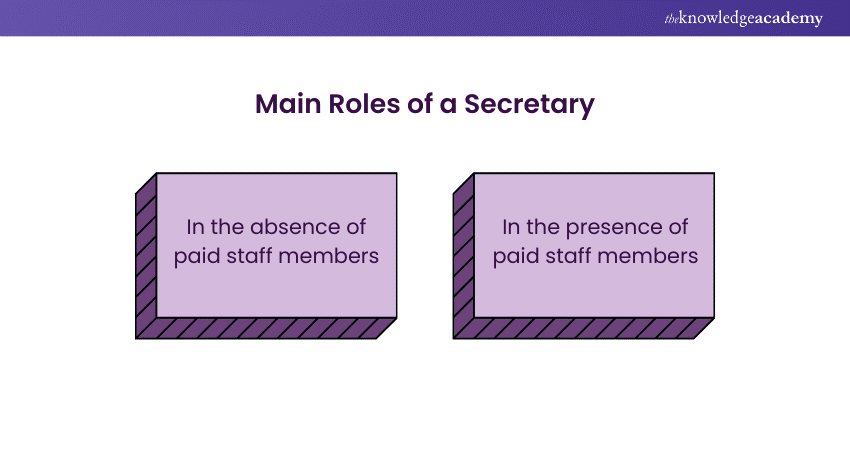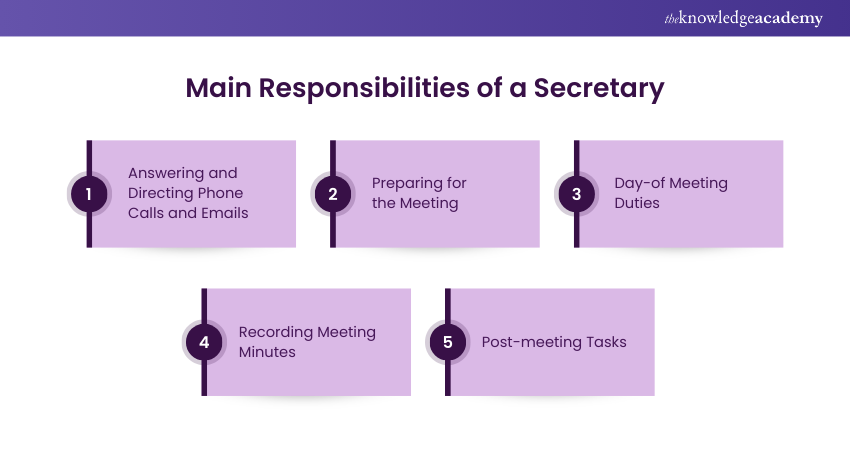We may not have the course you’re looking for. If you enquire or give us a call on 0800 446148 and speak to our training experts, we may still be able to help with your training requirements.
Training Outcomes Within Your Budget!
We ensure quality, budget-alignment, and timely delivery by our expert instructors.

Picture this- a bustling office, where the phone rings constantly, emails flood in, and meetings need to be scheduled. Amidst this chaos, the Secretary is in the key position holding everything together. The Role of a Secretary is pivotal in ensuring that the daily operations of an organisation run smoothly.
From managing communications to organising events, the Role of a Secretary is multifaceted and indispensable. Let’s dive into this blog to explore the various responsibilities and importance of this key position.
Table of Contents
1) Defining the Role of a Secretary
2) Responsibilities of a Secretary
a) Answering and Directing Phone Calls and Emails
b) Preparing for the Meeting
c) Day-of Meeting Duties
d) Recording Meeting Minutes
e) Post-meeting Tasks
3) Career Path of a Secretary
4) Conclusion
Defining the Role of a Secretary
Let’s begin by discussing the main Roles of a Secretary under two circumstances. Here's a complete overview:

In the Absence of Paid Staff Members
In some organisations, especially small or voluntary ones, there may not be any paid staff members to handle the administrative and clerical tasks. In such cases, the Role of a Secretary becomes even more important and challenging. The Secretary may have to perform a wide range of duties, such as the following:
a) Manage the organisation's correspondence, such as emails, letters, phone calls, etc.
b) Maintaining the organisation's records and documents, such as minutes, reports, policies, etc.
c) Organising and coordinating the meetings and events of the organisation, such as agendas, venues, invitations, catering, etc.
d) Liaising with the organisation's members, stakeholders, and external parties, such as donors, sponsors, media, etc.
e) Handling the finances and accounts of the organisation, such as budgets, invoices, receipts, etc.
f) Supporting the Chairperson and other office bearers of the organisation, such as providing advice, information, and assistance.
In the Presence of Paid Staff Members
In some organisations, especially large or professional ones, paid staff members may be responsible for administrative and clerical tasks. In such cases, the Role of a Secretary may become more focused and specialised. The Secretary may have to perform specific duties, such as the following:
a) Acting as the main point of contact and communication between the board or committee and the organisation's staff members.
b) Ensuring that the board or committee is informed and updated about the organisation's activities and progress.
c) Preparing and distributing the agendas and minutes of the board or committee meetings.
d) Ensuring that the decisions and actions of the board or committee are implemented and followed up by the staff members.
e) Monitoring and reporting on the compliance and governance of the organisation, such as legal, ethical, and regulatory requirements.
f) Representing and promoting the interests and values of the organisation to the public and other stakeholders.
Eager to crack your interviews for a secretary role, refer to our blog on Secretary Interview Questions.
Responsibilities of a Secretary
Here is the list of responsibilities of Secretary:

1) Answering and Directing Phone Calls and Emails
Handling phone calls and emails is a crucial part of a Secretary’s role. This involves:
a) Answering and screening calls to ensure they are directed to the appropriate person or department.
b) Managing email correspondence, including responding to enquiries, forwarding messages to relevant parties, and maintaining an organised inbox.
c) Scheduling appointments and meetings based on phone and email requests, ensuring there are no conflicts and all necessary parties are informed.
d) Maintaining a professional and courteous demeanour in all communications, reflecting the organisation’s standards and values.
e) Keeping records of communications for future reference and ensuring important information is documented and accessible.
Become an expert in Corporate Compliance and governance – register for our Company Secretary Training today!
Preparing for the Meeting
One of a Secretary's most important and visible responsibilities is to prepare for the organisation's meetings. It involves:
a) Consulting with the Chairperson and other relevant parties to determine the meeting's purpose, objectives, and agenda.
b) Sending out the notice and invitation of the meeting to the participants, along with the agenda and supporting documents, such as reports, proposals, etc.
c) Booking and arranging the venue, equipment, and catering for the meeting, as well as any travel and accommodation for the participants, if required.
d) Confirming the attendance and availability of the participants and making any necessary changes or adjustments to the agenda or arrangements.
e) Preparing and organising the materials and resources for the meeting, such as copies of the agenda, minutes, documents, etc.
Day-of Meeting Duties
Another key responsibility of a Secretary is to perform the day-of meeting duties. It involves the following:
a) Arriving early and setting up the venue and equipment for the meeting, such as chairs, tables, projector, microphone, etc.
b) Welcoming and registering the participants and distributing the materials and resources for the meeting, such as name tags, folders, pens, etc.
c) Assisting the Chairperson and other speakers or presenters during the meeting, such as introducing them, managing the time, facilitating the discussion, etc.
d) Taking notes and recording the meeting minutes, such as the attendance, apologies, decisions, actions, votes, etc.
e) Collecting and storing the materials and resources after the meeting, such as feedback forms, evaluation sheets, etc.
Join our Administrative Assistant Training and master the art of efficient Office Management - sign up now
Recording Meeting Minutes
Another essential responsibility of a Secretary is to record the meeting minutes. It involves:
1) Reviewing and editing the notes taken during the meeting, and ensuring that they are accurate, clear, and concise.
2) Formatting and structuring the minutes according to the style and standard of the organisation, such as headings, numbering, bullet points, etc.
3) Highlighting and summarising the key points and outcomes of the meeting, such as the decisions, actions, responsibilities, deadlines, etc.
4) Seeking approval and feedback from the Chairperson and other relevant parties on the draft of the minutes and making any necessary changes or corrections.
5) Distributing and filing the final version of the minutes to the participants and other stakeholders, such as the board, staff, members, etc.
Post-meeting Tasks
Another important responsibility of a Secretary is to perform the post-meeting tasks. It involves:
1) Following up and monitoring the implementation and completion of the agreed-upon decisions and actions during the meeting and reporting on the progress and results to the Chairperson and other relevant parties.
2) Updating and maintaining the records and documents of the organisation, such as the minutes, reports, policies, etc., and ensuring that they are accessible and secure.
3) Planning and preparing for the organisation's next meeting, such as setting the date, time, venue, agenda, etc.
4) Evaluating and improving the efficiency of the meeting process, such as soliciting feedback, identifying strengths and weaknesses, implementing suggestions, etc.
Career Path of a Secretary
Becoming a successful Secretary involves following a series of structured steps. Let’s explore them:
a) Acquire Education: Obtain a high school diploma or, preferably, an associate’s degree or certification in administrative assistance or Office Management. Courses in computer applications, office procedures, communication, and basic accounting are beneficial.
b) Develop Secretary Skills: Enhance typing, word processing, and office software skills. Improve written and verbal communication, organisational, and Time Management abilities. Attention to detail is crucial for tasks like proofreading and data entry.
c) Gain Experience: Seek entry-level positions or internships to understand daily administrative tasks. Volunteering can also provide valuable experience and professional references.
d) Network: Join professional associations and forums, attend workshops, seminars, and networking events to connect with peers, mentors, and potential employers.
e) Create a Portfolio: Compile a portfolio with examples of your work, letters of recommendation, and any awards. This showcases your skills and accomplishments to potential employers.
f) Stay Informed: Stay updated with the latest office software and productivity tools. Engage in continuous learning through online courses, certifications, and industry events to keep your skills current and advance your career.
Master the skills to excel in any administrative role – join our Secretarial Course now and secure a rewarding career!
Conclusion
In conclusion, the Role of a Secretary is multifaceted and vital to the smooth operation of any organisation. From managing communications to organising meetings and maintaining records, Secretaries are the backbone of administrative efficiency. By committing to continuous learning, you can pave the way for a successful career in this field.
Frequently Asked Questions

Key soft skills for a Secretary include strong communication, Time Management, organisational abilities, attention to detail, and problem-solving. Interpersonal skills, such as diplomacy and professionalism, are also essential for efficiently handling administrative tasks and supporting team members.

To be more effective, prioritise tasks, enhance your organisational skills, and maintain clear communication. Being proactive, managing your time wisely, and continuously improving your software skills can also increase efficiency.

The Knowledge Academy takes global learning to new heights, offering over 30,000 online courses across 490+ locations in 220 countries. This expansive reach ensures accessibility and convenience for learners worldwide.
Alongside our diverse Online Course Catalogue, encompassing 17 major categories, we go the extra mile by providing a plethora of free educational Online Resources like News updates, Blogs, videos, webinars, and interview questions. Tailoring learning experiences further, professionals can maximise value with customisable Course Bundles of TKA.

The Knowledge Academy’s Knowledge Pass, a prepaid voucher, adds another layer of flexibility, allowing course bookings over a 12-month period. Join us on a journey where education knows no bounds.

The Knowledge Academy offers various PA and Secretarial Course, including Secretarial, Office Skills and Office Manager Courses. These courses cater to different skill levels, providing comprehensive insights into Benefits of a Company Secretary.
Our Business Skills Blogs cover a range of topics related to PA and Secretarial Courses, offering valuable resources, best practices, and industry insights. Whether you are a beginner or looking to advance your PA and Secretarial skills, The Knowledge Academy's diverse courses and informative blogs have you covered.
Upcoming Business Skills Resources Batches & Dates
Date
 Company Secretary Training Course
Company Secretary Training Course
Fri 24th Jan 2025
Fri 21st Mar 2025
Fri 2nd May 2025
Fri 27th Jun 2025
Fri 29th Aug 2025
Fri 3rd Oct 2025
Fri 5th Dec 2025







 Top Rated Course
Top Rated Course



 If you wish to make any changes to your course, please
If you wish to make any changes to your course, please


